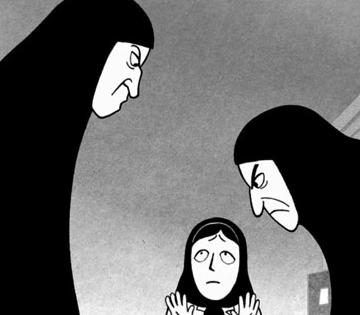|
Persepolis,
adapted for the screen by Marjane Satrapi from her two graphic
novels, is both an émigré memoir and
a love song to Persepolis, the fabled ancient capital of Persia
that lives now only in little Marji’s imagination. Persepolis
is her coming of age story that criss-crosses continents and
ideologies. Born in 1969 the daughter of educated, cultured
Persian Marxists and granddaughter of a Persian emperor, a
budding artist in her own right, how could she escape anything
but a complicated life?
Satrapi
collaborates with fellow graphic artist Vincent Paronnaud
to produce the animated film, with the same comic book style
black and white images that capture so vividly both the beauty and stark terror of her
childhood in war-torn and oppressive Islamic Republic of Iran.
But this film steers clear of overt politicizing, wisely opting
for a much more universal story of one extended family and
its devastation by the unfeeling, hydra-headed apparatus of
totalitarianism. French icon Catherine Deneuve voices
Marjane’s mother and her own daughter, Chiara Mastroianni,
plays Marjane, both to great effect.
capture so vividly both the beauty and stark terror of her
childhood in war-torn and oppressive Islamic Republic of Iran.
But this film steers clear of overt politicizing, wisely opting
for a much more universal story of one extended family and
its devastation by the unfeeling, hydra-headed apparatus of
totalitarianism. French icon Catherine Deneuve voices
Marjane’s mother and her own daughter, Chiara Mastroianni,
plays Marjane, both to great effect.
Marjane
is only 10 at the time of the Islamic Revolution, and it is
some time before she can comprehend her parents’ worried
whisperings or the peril that lurks beyond the walls of their
family home. For Marjane, always outspoken and sassy, the
new regime quickly becomes impossible to countenance. After
run-ins with the religious police over her heavy metal musical
addiction and her feminist orations at school, her parents
ship her off to Europe to complete high school. There another
adventure awaits her: a headlong dive into freedom, anonymity,
and eventually paralyzing loneliness. No one cares what music
she listens to, but no one cares, period. Lonely for her parents
and her homeland, she returns after graduation and eventually
marries, mostly so she and her boyfriend can be in each other’s
company without risking arrest on vice charges.
Her
story is full of love and intelligence but little soppy sentimentality.
On the one hand we can mourn the death of her wonderful
grandmother, who took her to Godzilla movies and
advised her on marriage problems, as much as she does. On
the other, we can also understand how fear can puncture her
most precious self-image and turn her, without a second thought,
into a snitch.
Satrapi
condenses a lot of story from her two novels for the sake
of length here, and it feels, well, incomplete. Without spoiling
the ending, I will just say it’s to me unsatisfactory.
Perhaps this is due to the fact that the author is still only
in her 20s; she still has much more to live and write.
You
might miss a reference or two if you haven’t read the
novel--like the two ‘gods’ she prays to as a child,
God Himself as well as Karl Marx, both wise, white-bearded
deities in her young eschatology. It’s impossible to
say now which will win the battle for her soul, but I’m
sure the journey will be interesting and well worth another
Persepolis or two.
--
Patricia Ducey
 |



